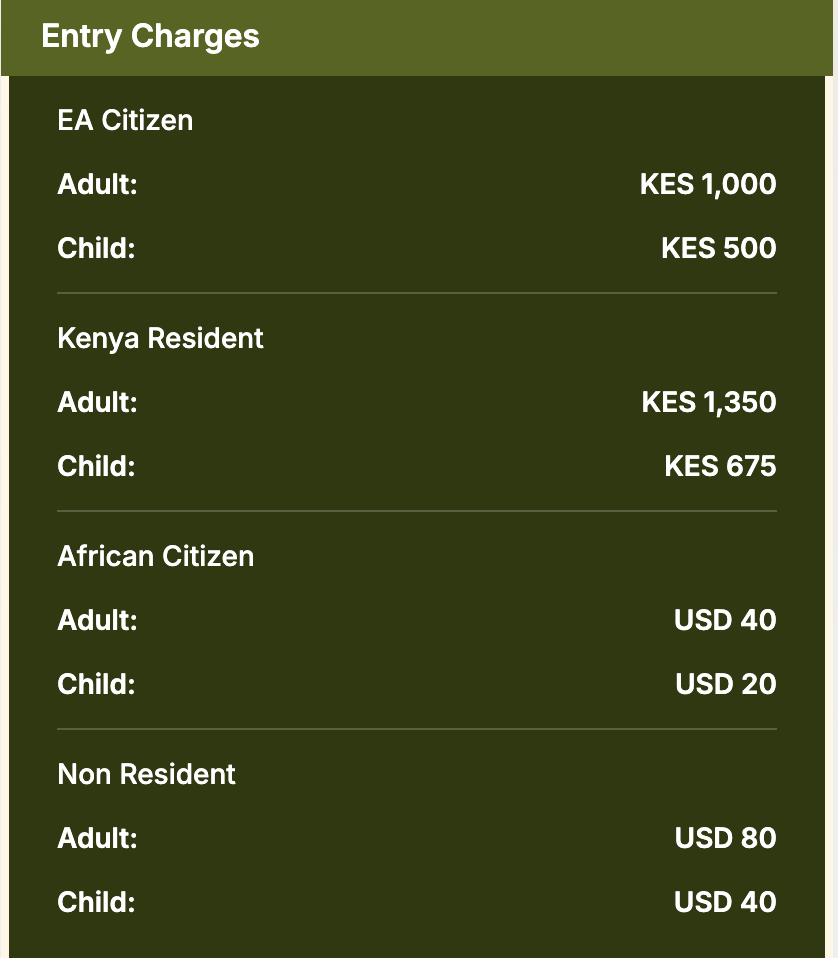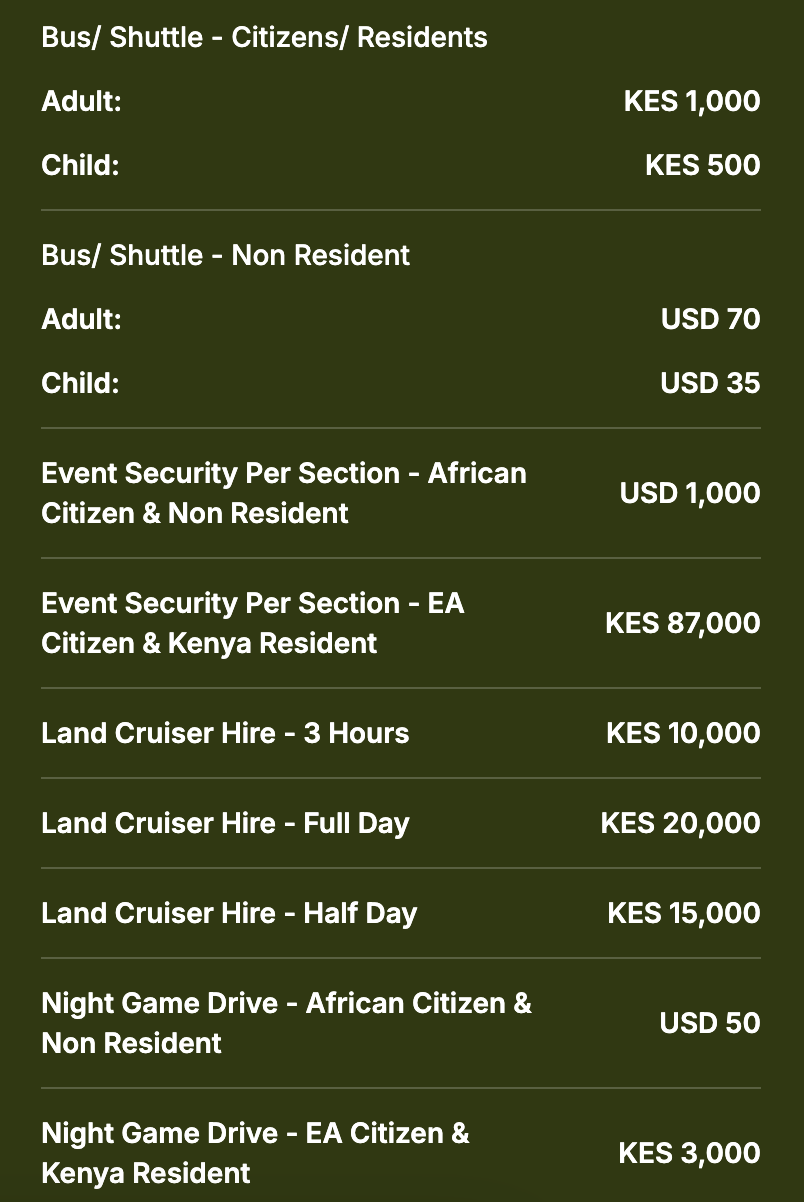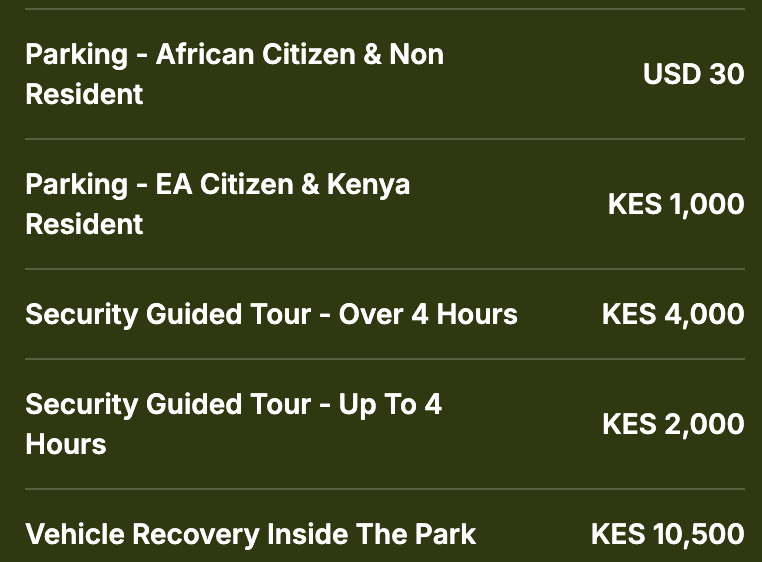Nairobi National Park — located just minutes from Nairobi’s city center — is one of the world’s only national parks within a capital city, offering game drives against the dramatic backdrop of the skyline.
Kenya Wildlife Service (KWS) has sought to revise park entry fees to reflect rising conservation costs — citing that current tariffs have remained largely unchanged for nearly two decades. However, two separate High Court rulings — first in 2024, and again in October 2025 — temporarily suspended KWS’s proposed fee increases, pending further judicial review.
As a result, despite KWS’s efforts to implement new rates, the previously approved rates remain in force until the court issues a final determination.
Here is a summary of the rates that are currently still being applied for the 2025/26 period:
Updated Nairobi National Park Fees (2026) — What You’ll Actually Pay Right Now
Kenya Wildlife Service (KWS) announced a revised fee structure for Nairobi National Park effective October 1, 2025, introducing seasonal pricing and higher non-resident rates aligned with global conservation standards. However, after public backlash, the High Court temporarily suspended the new tariff on October 2, 2025.
Despite this suspension, KWS has not reverted its booking system to the previous rates — meaning that as of late October 2025, visitors still see and are being charged the new, higher rates on the eCitizen portal.
KWS has issued an official communication stating that visitors should proceed to pay the displayed rates for now, and that refunds for any overpayments will be handled later, depending on the court’s final ruling.
🛂 Current Park Entry Fees Being Charged (as displayed on eCitizen)
| Category | Adult | Child (3–17 yrs) |
|---|---|---|
| Kenyan / EA Citizen | KES 1,000 | KES 500 |
| Kenya Resident / Work Permit Holder | KES 1,350 | KES 675 |
| African Passport Holder | USD 40 | USD 20 |
| Non-Resident (International) | USD 80 | USD 40 |
💡 These are the “new” rates — not the old ones — and they continue to be charged at time of booking online.
⚖️ Official Clarification from KWS — As Confirmed to NairobiPark.org
NairobiPark.org reached out directly to Kenya Wildlife Service (KWS) for an official clarification regarding the apparent contradiction between the court suspension and the fact that new rates are still being displayed and charged.
KWS confirmed the following:
Visitors should proceed to pay the currently displayed entry rates on eCitizen — including USD 80 for non-residents — as the system has not yet been reverted pending further court determination.
They further explained that:
- Cash is NO LONGER accepted at the Nairobi National Park gates
- Payment must be made via KWS portal on eCitizen which allows payments via card(such as Visa or Mastercard) and MPesa.
- If the High Court upholds the suspension, KWS will offer refunds for excess fees paid
- Visitors are advised to email customerservice@kws.go.ke with their eCitizen receipt to initiate any refund process
📌 In short — book and pay at the current displayed rate, then request a refund later if necessary.
Below is a link to eCitizen where you can check and purchase NNP tickets today:
https://kwspay.ecitizen.go.ke/single-park-entry/nairobi-national-park/guests
Old Nairobi National Park Entry Fees 2024/2025
Previous High Season Pricing (July to March):
- EAC Citizen/Resident:
- Adult: Kshs 430
- Child/Student: Kshs 215
- International Visitors:
- Adult: $43
- Child/Student: $22
Previous Low Season Pricing (March to June):
- EAC Citizen/Resident:
- Adult: Kshs 430
- Child/Student: Kshs 215
- International Visitors:
- Adult: $43
- Child/Student: $22
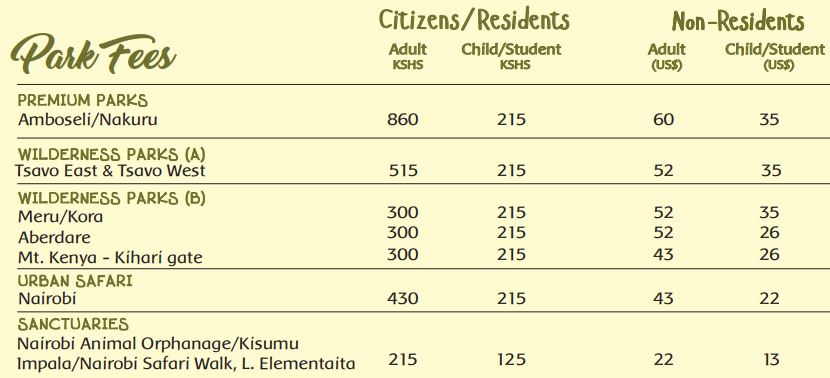
Additional Packages(Old)
Old Nairobi Package (Includes Nairobi National Park, Nairobi Animal Orphanage, Nairobi Safari Walk)
- High Season (July to March):
- EAC Citizen/Resident:
- Adult: Kshs 1,000
- Child/Student: Kshs 500
- Rest of Africa:
- Adult: $50
- Child/Student: $20
- International Visitors:
- Adult: $100
- Child/Student: $35
- EAC Citizen/Resident:
Old Nairobi Sanctuary Package (Includes Nairobi Orphanage, Nairobi Safari Walk)
- High Season (July to March):
- EAC Citizen/Resident:
- Adult: Kshs 250
- Child/Student: Kshs 125
- Rest of Africa:
- Adult: $20
- Child/Student: $10
- International Visitors:
- Adult: $40
- Child/Student: $25
- EAC Citizen/Resident:
Oct 2025 Update on NNP Entry Fees
Effective October 1, 2025, the Kenya Wildlife Service (KWS) had announced new, higher conservation and park entry fees for all KWS-managed parks and reserves — including Nairobi National Park.
Under the proposed new schedule, the daily park entry fees for Nairobi National Park were to increase as follows:
| Visitor Category | Adult | Child |
|---|---|---|
| East African Citizen | KES 1,000 | KES 500 |
| Kenya Resident | KES 1,350 | KES 675 |
| African Citizen | USD 40 | USD 20 |
| Non-Resident (International Visitor) | USD 80 | USD 40 |
Nairobi National Park – Official Entry & Package Fees (2026)
1. Standard Nairobi National Park Entry Ticket Cost (Urban Park Category)
| Visitor Category | Adult | Child / Student |
|---|---|---|
| East African Citizen | KES 1,000 | KES 500 |
| Kenya Resident | KES 1,350 | KES 675 |
| African Citizen | USD 40 | USD 20 |
| Non-Resident | USD 80 | USD 40 |
Nairobi National Park Entry Fees for Non-Residents
As of 2026, non-resident visitors to Nairobi National Park are required to pay a flat conservation entry fee of USD 80 per adult and USD 40 per child or student, applicable year-round and valid for a single-day entry of up to 24 hours. This new structure replaces the long-standing, lower-cost pricing model that had positioned Nairobi National Park as one of the most affordable safari destinations for international visitors in East Africa.
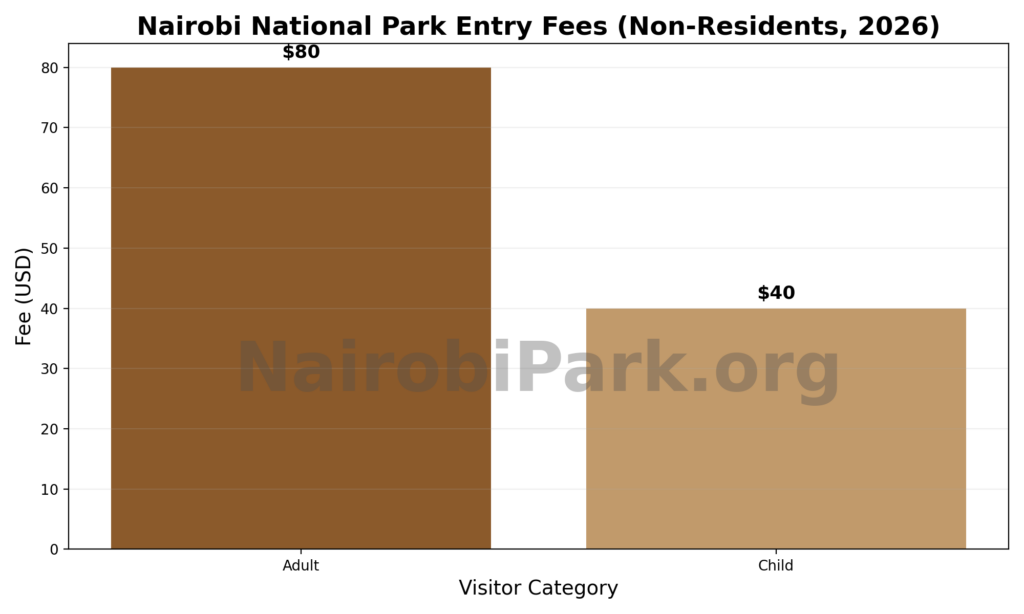
By comparison, during 2024 and 2025, non-resident entry fees stood at USD 43 for adults and USD 22 for children or students, with no meaningful differentiation between high and low seasons.
The transition to the 2026 rates therefore represents a substantial recalibration of international pricing, with adult fees increasing by approximately 86% and child or student fees rising by about 82% within a single revision cycle. Such a steep adjustment is uncommon in protected-area pricing and signals a deliberate policy shift rather than incremental inflationary change.
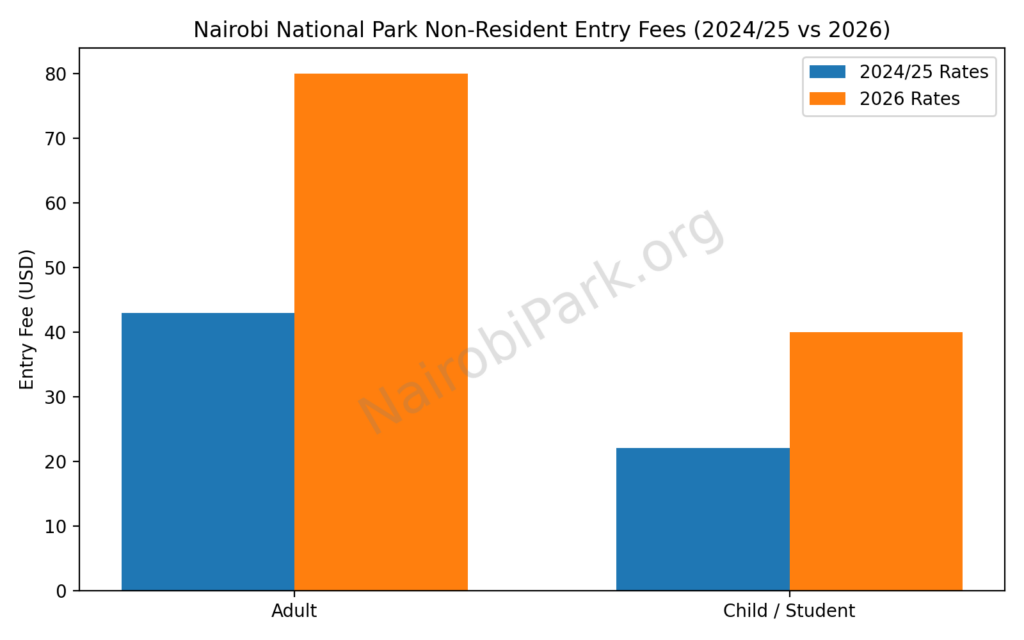
NNP Entrance Fee Cost for Citizens in 2026:
As of 2026, Kenyan citizens visiting Nairobi National Park pay a revised conservation entry fee of KES 1,000 per adult and KES 500 per child or student, applicable year-round for a single-day (24-hour) entry. This marks a decisive departure from the long-standing pricing model that had remained largely unchanged for over a decade and represents one of the most significant domestic fee adjustments in the park’s history.
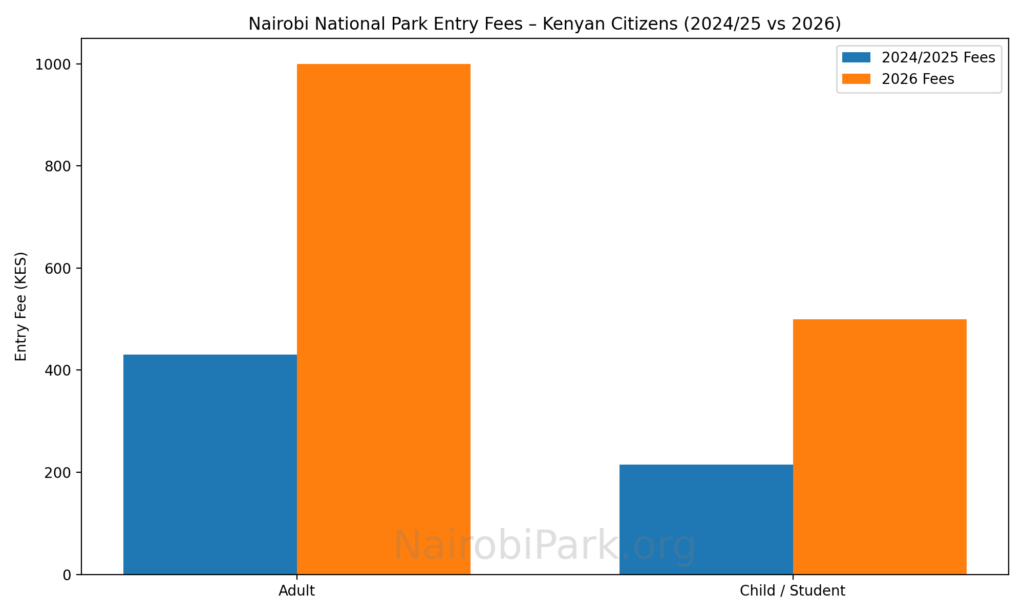
Under the 2024/2025 fee structure, Kenyan citizens paid KES 430 per adult and KES 215 per child or student, with no distinction between high and low seasons. The shift to the 2026 rates therefore constitutes an increase of approximately 133% for adults and 133% for children/students, effectively more than doubling the previous entry fees. While substantial in percentage terms, the absolute price point remains modest by regional and international standards.
Comparison of Nairobi National Park Entry Fees for Kenyan Citizens
| Category | 2024/2025 Fee | 2026 Fee | Absolute Increase | Percentage Increase | Expert Interpretation |
|---|---|---|---|---|---|
| Adult | KES 430 | KES 1,000 | +KES 570 | ≈133% increase | Reflects long-overdue cost realignment after years of underpricing relative to conservation costs. |
| Child / Student | KES 215 | KES 500 | +KES 285 | ≈133% increase | Maintains proportional affordability for families and school groups despite higher baseline costs. |
🦁 Nairobi National Park Entry Fees for African Citizens (2026)
Under the current Kenya Wildlife Service (KWS) fee schedule, African citizens (non-East African) pay:
- Adult: USD 40
- Child / Student: USD 20
These rates are set as flat daily fees, valid for a 24-hour park entry.
🔍 Comparative Context vs Previous Rates
According to earlier park rate information, prior entry charges for African citizens were also USD 40 for adults and USD 20 for children before 2026, meaning the 2026 revision did not adjust these particular fees.
📊 Nairobi National Park Entry Fees for East African Citizens (2026)
For visitors from the East African Community (EAC) — including citizens of Kenya, Uganda, Tanzania, Rwanda, Burundi, and South Sudan — the current 2026 entry fees to Nairobi National Park are:
- Adult: KES 1,000
- Child / Student: KES 500
These fees apply for a 24-hour ticket into the park and are assessed via the Kenya Wildlife Service (KWS) digital system.
📈 Contrast With 2024–2025 Fees
Under the 2024/25 rate structure, EAC citizens paid:
- Adult: KES 430
- Child / Student: KES 215
Compared to this baseline, the 2026 rates represent a dramatic uplift in domestic park pricing:
- Adult fee: increased by KES 570, a ≈133% rise
- Child/Student fee: increased by KES 285, also a ≈133% rise
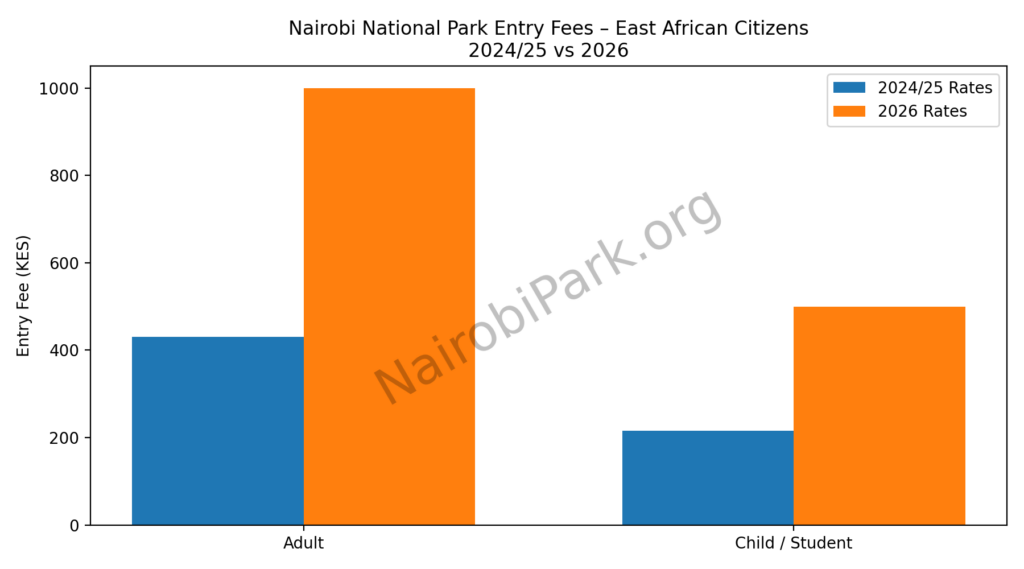
Valid for:
- Single entry
- Up to 24 hours
- Ideal for half-day (4–5 hr) or full-day game drives
- Link to purchase ticket: https://kwspay.ecitizen.go.ke/single-park-entry/nairobi-national-park/guests
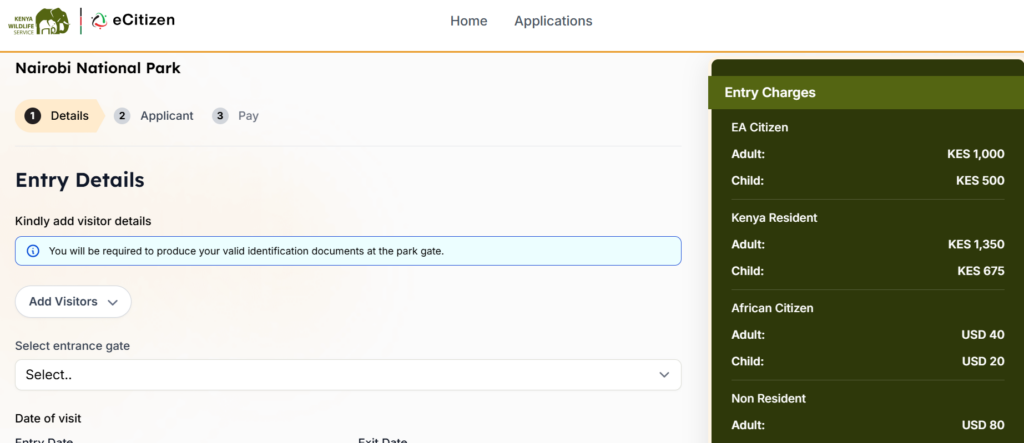
A note about Driver Entry Fees
If you have booked a tour with NairobiPark.org—whether a half-day tour (morning or afternoon) or a full-day safari—the default entry point to select is Main Gate (Langata Road), unless you are entering directly from the airport. When purchasing your park ticket, and prompted with the question “Are you paying for a driver or vehicle?”, please select “No”, as the driver and vehicle entry fees are already included in your all-inclusive tour package. More details on our contact page on how to purchase Nairobi NP tickets(under helpful notes).
If you are driving yourself into Nairobi National Park, please note that driver entry fees are charged at the standard adult visitor rate. There is no special driver rate unless the driver holds a valid Tourism Regulatory Authority (TRA) tour guide/driver license, in which case the applicable exemption is handled at the gate in line with KWS procedures.
Nairobi National Park Entry Fees for Kenya Residents
For visitors classified as Kenya Residents (non-citizens legally residing in Kenya with a valid residence permit), the Kenya Wildlife Service (KWS) applies a resident-rate conservation fee to access Nairobi National Park.
The entrance fee for Kenyan residents to Nairobi National Park is KES 1,350 for adults and KES 675 for children aged 5–17, with children under 5 years admitted free of charge. Compared to the non-resident adult rate of USD 80, residents pay over 85% less, reflecting the substantial pricing advantage extended to long-term residents. In comparison, Kenyan citizens pay KES 1,000 per adult, meaning residents pay approximately 35% more than citizens, while still benefiting from a significantly lower rate than international visitors. This tiered pricing structure underscores Kenya Wildlife Service’s policy of prioritizing access for citizens first, residents second, and non-residents at higher conservation cost-recovery levels.
Nairobi National Park – Entry Fees for Kenya Residents
| Visitor Category | Fee (KES) |
|---|---|
| Adult | 1,350 |
| Child / Student | 675 |
Notes for residents:
- You must present a valid Kenyan residence permit at the gate or during online ticket purchase to qualify for resident rates.
- Tickets are single-entry, even though they remain valid for up to 24 hours.
- Vehicle entry fees are charged separately unless included in an all-inclusive safari package.
2. Nairobi City Wildlife Package 2026
(Nairobi National Park + Animal Orphanage + Safari Walk)
| Visitor Category | Adult | Child / Student |
|---|---|---|
| East African Citizen | KES 1,300 | KES 700 |
| Kenya Resident | KES 1,750 | KES 950 |
| African Citizen | USD 55 | USD 20 |
| Non-Resident | USD 105 | USD 55 |
Best for:
- First-time visitors
- Families
- Educational & conservation-focused visits
- Visitors wanting maximum value in one day
- Link to purchase package: https://kwspay.ecitizen.go.ke/single-park-entry/nairobi-package/guests
3. Nairobi Wildlife Sanctuary Package
(Animal Orphanage + Safari Walk only — no game drive)
| Visitor Category | Adult | Child |
|---|---|---|
| East African Citizen | KES 500 | KES 300 |
| Kenya Resident | KES 675 | KES 500 |
| African Citizen | USD 25 | USD 15 |
| Non-Resident | USD 40 | USD 20 |
Note:
- Does not include Nairobi National Park entry
- Suitable for short visits, school groups, or mobility-friendly experiences
- Link to purchase sanctuary package: https://kwspay.ecitizen.go.ke/single-park-entry/nairobi-sanctuary-package/guests
- Link to purchase Safari Walk Ticket:https://kwspay.ecitizen.go.ke/single-park-entry/nairobi-safari-walk/guests
- Link to purchase Animal Orphanage Ticket: https://kwspay.ecitizen.go.ke/single-park-entry/nairobi-animal-orphanage/guests
Quick Visitor Takeaway
- Half-day NNP safari → Standard Nairobi National Park entry is sufficient
- Full-day or combo experience → Nairobi City Wildlife Package offers best value
- Short city stopover → Sanctuary Package (no game drive)
Important Pricing Notes
- Children: Aged 5–17 years
- Free entry:
- Children under 5 years
- Registered tour drivers & guides (TRA-licensed). Registered tour drivers and guides (TRA-licensed) should note that while TRA accreditation is recognized at the park gates, the online KWS eCitizen platform does not currently provide an option for TRA-licensed guides to obtain complimentary entry tickets. As a result, TRA-licensed driver-guides should be prepared to pay the vehicle entry fee at the gate, using card or MPesa, where the exemption is processed manually by park staff.
- Single-use ticket: Re-entry requires a new ticket
- Park hours: 6:00 AM – 6:00 PM
- Plastic-free park: Single-use plastics prohibited
What These Fees Do Not Include
To avoid visitor confusion, clearly separate:
- Safari vehicle (4×4 Land Cruiser or van). We offer safari vehicle rentals with driver for Nairobi NP tours here.
- Driver-guide services
- Fuel
- Photography / filming permits
- Special activities (walking safaris, ranger-guided experiences)
These are operator-quoted costs, not KWS charges.
Single-Entry Park Tickets & Lunch Planning at Nairobi National Park
While a Nairobi National Park entry ticket is valid for up to 24 hours, it is important to note that it is single-entry only. This means that once you exit the park—for example, to go out for lunch—you are required to purchase a new ticket in order to re-enter, even if the original 24-hour validity period has not expired.
For guests planning a full-day safari, we strongly recommend carrying a packed lunch instead of exiting the park midday. Nairobi National Park has several well-maintained designated picnic sites, allowing you to stop, eat, and rest comfortably without leaving the park. This approach not only maximizes time spent in wildlife areas but also helps visitors avoid paying twice for park entry tickets while enjoying an uninterrupted safari experience.
For guests choosing a half-day safari, this ticket structure aligns naturally with meal times. Our morning half-day safari, which starts at 6:00 AM, typically concludes late morning, allowing you to exit the park just in time for lunch outside the park. Similarly, the afternoon half-day safari, starting at 1:00 PM, fits perfectly for guests who prefer to have lunch beforehand and then enter the park after. These options provide a seamless experience without the need to manage packed meals or re-entry tickets.
Vehicle Entry Fees at Nairobi National Park
In addition to individual visitor entry tickets, the Kenya Wildlife Service (KWS) charges a separate vehicle entry fee per day for vehicles entering Nairobi National Park. These fees apply mainly to private vehicles, self-drive visitors, and non–all-inclusive arrangements, and are determined by the seating capacity of the vehicle, not the number of occupants. The structure reflects vehicle size and relative impact on park infrastructure and is based on the official KWS Conservation Fees (effective October 2025).
In practical terms, most private cars and small SUVs with fewer than six seats pay KES 600 per day. A standard safari 4×4 Land Cruiser, typically customized for tours and carrying 5–8 passengers, falls into the 6–12 seat category and is charged KES 1,500 per day. Mini-buses, such as Coasters, are charged KES 3,000, while large buses and coaches pay KES 4,500 to KES 5,000 per day, depending on seating capacity.
Nairobi National Park – Vehicle Entry Fees (Per Day)
| Vehicle Category | Seating Capacity | Fee (KES) |
|---|---|---|
| Small vehicles | Less than 6 seats | 600 |
| Medium vehicles | 6–12 seats | 1,500 |
| Large vehicles | 13–24 seats | 3,000 |
| Extra-large vehicles | 25–44 seats | 4,500 |
| Buses / Coaches | 45 seats and above | 5,000 |
Important note: Vehicle entry fees are separate from individual park entry tickets. If you book an all-inclusive safari with a licensed operator or with us(NairobiPark.org), these vehicle fees are already included in your tour price and do not need to be paid separately.
More on KWS Fees Price Increase:
Similar entry fee increases have been effected in other major parks such as Amboseli NP and Lake Nakuru (KES 1,500 for citizens and USD 90 for non-residents). Check Amboseli National Park entry fees here.
However, on October 2, 2025, the Milimani High Court issued conservatory orders suspending implementation of these new rates after a petition was filed by the Kenya Tourism Federation (KTF).
The court halted the rollout pending full determination of the case — meaning that all KWS-managed parks and reserves are still charging the previous (old) rates until further notice.
While awaiting the Court’s decision the entry charges that applied for Nairobi National Park were as follows:
| Visitor Category | Adult | Child/Student |
|---|---|---|
| EAC Citizen / Resident | KES 430 | KES 215 |
| International Visitor (Non-Resident) | USD 43 | USD 22 |
In summary, while the new conservation fees were approved and publicly communicated for implementation starting October 1, 2025, the court order has temporarily suspended them. Visitors to Nairobi National Park and all other KWS parks should therefore expect to pay the old rates shown above until the legal process concludes.
No Updated Nairobi National Park Entry Fees for 2024/2025
In late 2023, Kenya Wildlife Service (KWS) formally proposed a comprehensive revision of entry fees for Nairobi National Park. While public communication often highlighted the headline jump for adults, the proposal also included parallel increases for children/students and East African Community (EAC) citizens, maintaining the long-standing KWS pricing ratios between adults and children.
The proposal was challenged in court and ultimately set aside by the High Court of Kenya in early 2024, resulting in 2023 rates remaining in force throughout 2024/25.
Background on the Planned Price Hike
In late 2023, Kenya Wildlife Service (KWS) proposed a substantial increase in the park entry fees across various categories, including rates for East African Community (EAC) citizens/residents, visitors from the rest of Africa, and international tourists. The rationale for this proposed hike was based on:
- Upgrades in infrastructure within the park, including enhanced visitor services, wildlife conservation efforts, and improved facilities.
- The unique value of Nairobi National Park as the only national park in the world located within a capital city, offering visitors a premium wildlife experience against the backdrop of Nairobi’s skyline.
The proposed fee structure included a significant increase, with EAC citizen adult entry fees rising from Kshs 430 to Kshs 2,000—a 365% increase—and international visitor fees increasing from $80 to $100.
Legal Challenge and Court Ruling
However, the proposed fee increases faced strong opposition, particularly from Kenyan citizens, who argued that the price hike was unjustified and would limit access to the park for local communities. The challenge was primarily driven by:
- Affordability concerns, with the argument that the steep increase in fees would disproportionately affect EAC citizens and students, thereby limiting the park’s accessibility to local families, schools, and groups.
- Public interest, emphasizing that Nairobi National Park is a national treasure and should remain affordable to Kenyans, especially given the country’s commitment to encouraging local tourism and conservation awareness.
In response to the public outcry, citizens took legal action, and the case was heard by the High Court of Kenya in early 2024. The court reviewed the arguments presented by both sides, including:
- KWS’s defense, which justified the increase based on the rising costs of park management, conservation initiatives, and the enhancement of visitor experiences.
- Petitioners’ arguments, which focused on ensuring that the park remains accessible to ordinary Kenyans and argued that the price hike was disproportionately high, especially given the current economic challenges.
Court’s Decision
The High Court ruled in favor of the petitioners, setting aside the proposed 2024 price hike. The court’s decision was based on the following key considerations:
- Public interest: The court acknowledged that Nairobi National Park holds a special place in Kenya’s national heritage, and maintaining affordable access is crucial for promoting local tourism and environmental awareness.
- Economic Impact: The court highlighted that the significant increase in fees would create an economic barrier for many local visitors, particularly students and families, thereby reducing overall park attendance and undermining public support for conservation efforts.
- Proportionality: The court found that the proposed fee increase, especially for EAC citizens, was disproportionate and lacked sufficient justification.
As a result, the High Court blocked the implementation of the proposed 2024 entry fees and ordered that the current fees (from 2023) remain in place for 2024. This ruling ensures that:
- EAC citizens continue to enjoy the park at the affordable rate of Kshs 430 for adults and Kshs 215 for children/students.
- International visitors will still pay $80 for adults and $35 for children/students, with no additional charges introduced in 2024.
Implications of the Court Ruling
The ruling is seen as a victory for public access to one of Kenya’s most iconic parks. It ensures that Nairobi National Park remains affordable and accessible to local visitors, reinforcing the notion that Kenya’s natural heritage should be enjoyed by all.
This legal decision also sets a precedent for public participation in matters concerning national assets. The case underscores the importance of balancing park management needs and conservation funding with ensuring accessibility for the Kenyan public, especially as the country continues to promote domestic tourism.
Conclusion
The significant proposed fee increases would have greatly impacted the pricing for EAC citizens and residents, with a steep rise in costs. However, the High Court’s decision ensures that the current 2023 rates will remain in place for 2024/25. This means that visitors will continue to enjoy Nairobi National Park’s unique safari experience at affordable rates.
For visitors planning a trip, the Nairobi Package and Sanctuary Package continue to offer excellent value, especially for those interested in experiencing multiple attractions in one visit. Additionally, international visitors can still experience the park’s incredible wildlife and urban safari landscape at the competitive rate of $80 per adult. The current fees reflect Nairobi National Park’s dedication to providing world-class safari experiences while making it accessible to a wide range of visitors.
Is the Blocked Price Increase Denying Funds Needed for Nairobi National Park Conservation Efforts?
The blocked 2024 price increase for Nairobi National Park has raised concerns about the impact on funding for conservation efforts. The Kenya Wildlife Service (KWS) had proposed a significant fee hike to address the rising costs of maintaining the park, enhancing infrastructure, and supporting crucial conservation programs such as anti-poaching and wildlife monitoring. For example, the proposed increase for EAC citizens (from Kshs 430 to Kshs 2,000 for adults) would have provided a substantial boost in revenue.
Financial Impact of the Blocked Hike:
- Reduced Revenue: Without the fee increase, KWS may struggle to cover growing conservation and operational costs.
- Conservation Challenges: Important initiatives like habitat restoration and wildlife monitoring could face delays or cutbacks.
- Missed Upgrades: Planned improvements in visitor facilities may also be affected, potentially reducing international appeal.
Balancing Accessibility and Conservation
While the price hike could have bolstered conservation funding, it would have made the park less accessible to local visitors, including families and students. This would have reduced local engagement, which is essential for conservation awareness and long-term support.
Exploring Alternatives
KWS could pursue alternative funding sources such as:
- Government subsidies and international conservation grants.
- Private sponsorships or premium tourism services.
- Domestic tourism campaigns to maintain local involvement while generating consistent revenue.
Conclusion
Though the blocked price hike limits some funding, it ensures that Nairobi National Park remains accessible to local citizens, fostering ongoing conservation support. To sustain its conservation efforts, KWS must innovate its revenue strategies through a mix of alternative funding and enhanced tourism services without relying solely on higher entry fees.
Other Ways to Support Nairobi National Park (NNP)
Supporting Nairobi National Park goes beyond park entry fees. Here are key ways individuals and organizations can contribute to conservation:
1. Join “Friends of Nairobi National Park” (FoNNP)
Participate in cleanup drives, wildlife monitoring, and advocacy efforts through this community-based organization that supports park conservation.
2. Volunteer for Conservation Programs
Contribute by helping with wildlife tracking, habitat restoration, and anti-poaching campaigns organized by KWS and other local organizations.
3. Adopt Conservation Projects
Support initiatives like Adopt a Rhino or wildlife corridors to help protect endangered species and maintain critical habitats.
4. Sponsor Educational Programs
Fund school trips, conservation workshops, and community outreach programs that raise awareness about wildlife protection.
5. Corporate Social Responsibility (CSR)
Companies can sponsor park infrastructure projects, support renewable energy efforts, or contribute to eco-friendly initiatives within the park.
6. Participate in Wildlife Safaris
Book conservation safaris or photography tours where part of the proceeds support park conservation efforts.
7. Promote Sustainable Tourism
Encourage eco-friendly travel options, stay at eco-lodges, and advocate for sustainable tourism practices that minimize environmental impact.
8. Carbon Offset Donations
Donate to carbon offset programs like reforestation to mitigate the environmental impact of visiting the park.
9. Fundraising Events
Join or organize events like charity runs and wildlife-themed fundraisers to raise funds for conservation projects.
10. Be a Responsible Visitor
Follow park rules, minimize waste, and leave no trace to help protect the park’s natural environment.
By participating in these activities, visitors and organizations can actively contribute to the preservation and sustainability of Nairobi National Park, ensuring it remains a vital wildlife sanctuary for future generations.
Nairobi National Park Safari Pricing — Private Toyota Land Cruiser (NairobiPark.org)
Nairobi National Park Safari Pricing
Private 4×4 Land Cruiser with Driver-Guide
(Park entry fees excluded)
| Number of Guests | Half-Day Nairobi National Park Safari Price per Person (USD) | Half-Day Safari Total Cost (USD) | Full-Day Nairobi NP Safari Price per Person (USD) | Full-Day Safari Total Cost (USD) |
|---|---|---|---|---|
| 1 person | $180 | $180 | $220 | $220 |
| 2 people | $100 | $200 | $130 | $260 |
| 3 people | $80 | $240 | $110 | $330 |
| 4 people | $70 | $280 | $90 | $360 |
| 5 people | $60 | $300 | $80 | $400 |
| 6 people | $50 | $300 | $70 | $420 |
| 7 people | $45 | $315 | $60 | $420 |
Included: Private 4×4 Land Cruiser with pop-up roof, driver-guide, pick-up/drop-off from any Nairobi hotel or airport.
Not Included: Nairobi National Park entry tickets (paid separately via eCitizen or by card at the gate).
Read more details about the inclusions and exclusions of both the half-day(morning or afternoon) or full-day Nairobi NP tours.

